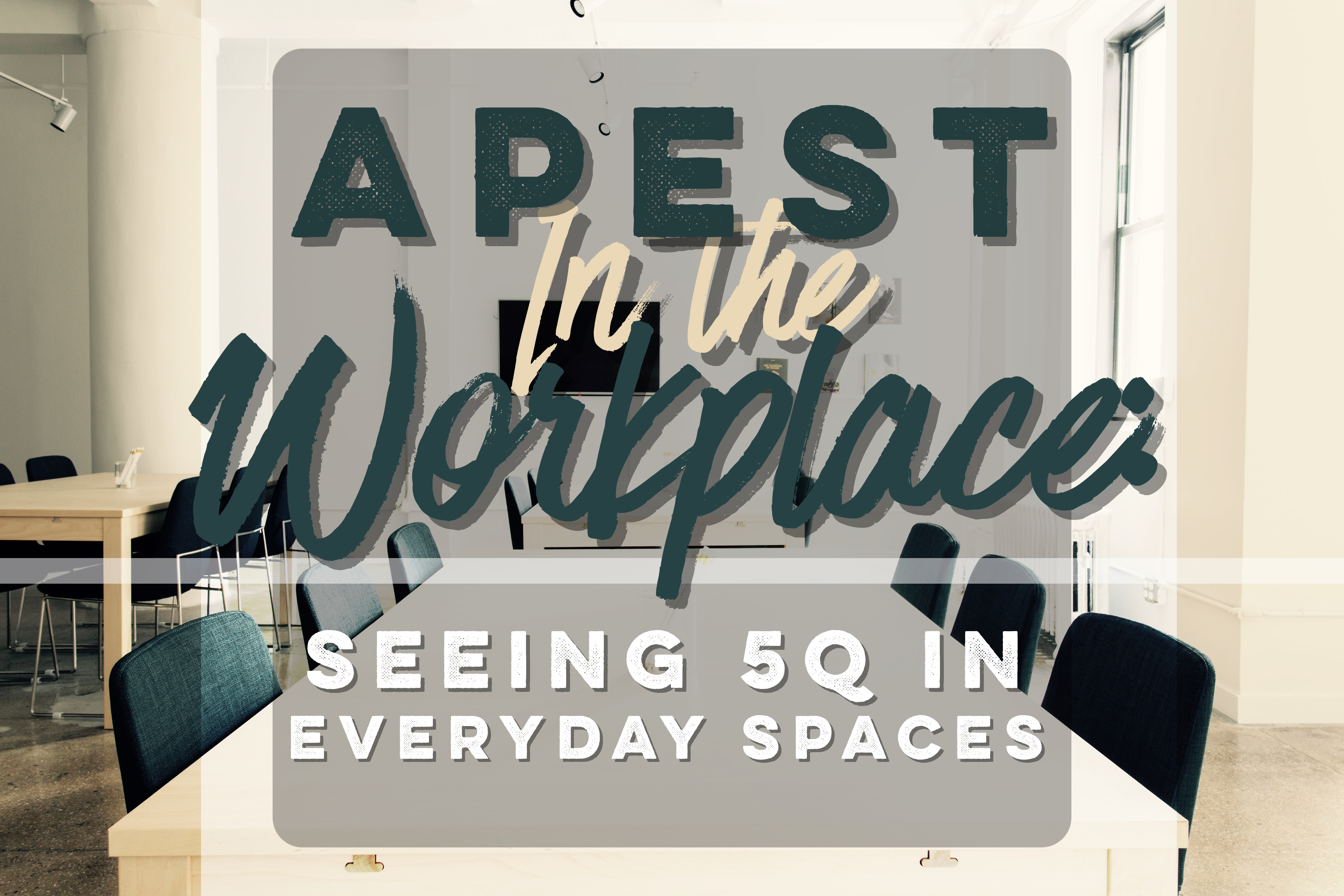
A few posts ago, Jon Ritner shared how he uses APEST to disciple his children before bedtime. Not only was it a fresh and brilliant approach to applying 5Q to everyday life, it has been one of the most read posts that we’ve published on the blog.
[bctt tweet=”There’s something powerful about seeing 5Q come to life in things that make up our actual lives!” username=”5qcollective”]
We love Jon’s post and highly suggest you check it out if you haven’t already. We promise that it will give you an idea or two how to engage the APEST dimensions in ways you might not have thought about yet.
Today, we’re going to focus on APEST in the workplace. If you can use 5Q to disciple at home, then read on to discover how you can engage 5Q to transform your work culture.
So the question becomes: how do you identify the Apostle in your staff meeting, the Prophet in the board room, the Evangelist on the marketing call, the Shepherd by the water cooler and the Teacher at the Xerox?
In his practical book Leading with Questions, human resource expert Michael Marquardt could well be speaking about the prophetic role when he says: “The failure to ask questions . . . allows us to operate with a distorted sense of reality.” He refers to organizations that are unable to question their prevailing view of reality as zombies. A zombie organization, he says, is a walking corpse that does not yet know that it is dead “because it has created an insulated culture that systematically excludes any information that could contradict its reigning picture of reality.” If a community receives only positive feedback, it will never be able to discover its weak points or failures. Prophets initiate the process of critical feedback that is necessary for organizational learning. We need to give permission to prophets and their dissenting voices. Stifling holy dissent is a guaranteed way to create bigger problems down the line. “Turn off your radar and you will eventually hit the side of a mountain.” – The Permanent Revolution
So, today we are going to zombie-proof your missional calling and help you navigate 5Q where you work. At the same time, we are going to show you how to get practical with some of the tables that you find in the 5Q book. Once you get familiar with the shapes of APEST, the core characteristics, you begin to see them functioning all around you.† So, here is how you can begin to identify these 5Q personalities in the workplace.
The Apostle in the Staff Meeting
Whose voice is priming the organization for innovation and entrepreneurship?
Who is developing capacities for appropriate risk taking?
Who is challenging the room to dream dreams? To imagine the company forward?
Who reminds the room of the greater vision and their commitment to maintain it?
Who walks from office to office challenging and inspiring people to see themselves in new ways?
That’s the Pioneer, the Innovator, the Entrepreneur, the Culture Creator at work.
There’s your Apostle.
Who is maintaining self-critical insight in the organization and the employees?
Who questions policy and decision when they become inhuman, self-protective and/or oppressive?
Who safeguards the organization from missional drift? From straying from the vision? From wandering too far from the values that maintain the organizational integrity?
Who confronts power when it is vital to do so?
Who fuels passion for the company’s purpose?
That’s the Activist, the Intercessor, the “Passionary”.
There’s the Prophet.
Who is naturally developing an invitational and welcoming culture?
Who develops the stickiness and simplicity of the core message?
Who reaches out, connecting outsiders to insiders, to the product or service?
Who maintains positive, life-affirming and redeeming “vibes” in the organization or office?
Who consistently champions the cultural relevance of the organization?
That is the Networker, the Deal Maker, The Marketer, Storyteller.
There’s the Evangelist.
Who builds relationships with the marginalized, the different, the non-performers?
Who creates space where the hurting can feel cared for? The quieted can be heard?
Who spends more time listening and relating than they do speaching and directing?
Who works with employees, helping them gain experience, growing in their positions and skills?
Who works to ensure the appropriate protection of employees and customers?
That is the Healer, the Relator, the Human Resource rep, the Community Developer.
There’s the Shepherd.
Who develops resources, policies and programs for continued learning?
Who is committed to strong means of knowledge transfer?
Who encourages active learning experiences, perhaps through case studies, role play and new practices?
Who works in such a way that they cultivate a culture of curiosity and love of organizational insight?
Who creates a culture of organizational wisdom, departmental congruence and best practices?
That is the Mentor, the Educator, the Thinker/Philosopher, the Instructor.
There’s the Teacher.
Like a healthy church, a healthy organization will also nurture all five of the APEST roles. Granted, in most work-places they won’t perform a Christian function, but this shows that the 5Q typology is so primordial, so foundational, it can be observed everywhere.
If you are able to start identifying the 5Q qualities that you see in the people around you, you can begin to shape a 5Q team around you, a group of diverse gifting that together bring a wholeness, productivity and an energized approach to projects, meetings and everyday conversations.
If you have trouble figuring who has which particular gifting, engage people. Ask questions.
 Ask them about their passions. What do they love most about working where they do? Doing what they do? If they could do anything what would it be? What was their favorite job? What is their dream job? Why?
Ask them about their passions. What do they love most about working where they do? Doing what they do? If they could do anything what would it be? What was their favorite job? What is their dream job? Why?
These questions will lead you in the direction of their 5Q.
Once you are dialed into the personalities around you, here are some ways to approach 5Q on the job:
- Make sure to include all five personalities in critical conversations.
- Ask questions like, “What would Mike say about this? Or what would Sally add if she were here?”
- How can you bring 5Q voices into discussion where they aren’t usually?
- If you can’t move people around, include different 5Q functions in your thinking:
- “How would a Mentor approach working with Stan?”
- “Do we need the help of a Healer/Relator in this tense situation?”
- “How could a Storyteller improve the focus of my front office?”
- “What would change if an Intercessor spoke truth in this moment?”
- “Do we need an Innovator to help us see a way forward that we are missing?”
We would love to hear other ways that you are applying 5Q to you work, neighborhood, non-church staff environments. Please leave us a comment below and start a conversation!
†If you have a copy of the book, you can refer to Tables 7.1 and 7.2 and really dig in. If you don’t have the book, you can order it here.

